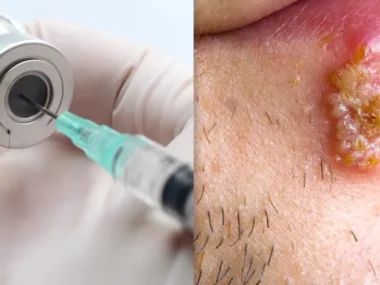High blood pressure, also known as hypertension, is a medical condition in which the flow of blood in the walls of the arteries is consistently too high. This condition can lead to serious health problems such as heart disease, stroke, and kidney failure.
Normal blood pressure is normally considered to be around 120/80 mmHg. However, blood pressure can differ depending on factors such as age, gender, and overall health status. Blood pressure is considered to be high if it consistently rises above 130/80 mmHg.
There are many factors that can lead to hypertension, including genetics, age, lifestyle factors such as diet and physical activity, and underlying health conditions such as diabetes and kidney disease. Treatment for high blood pressure typically involves lifestyle changes such as a healthy diet and exercise, as well as medications if needed. It is important to monitor and manage high blood pressure to prevent serious health complications.
For this reason early detection is important. To measure your risk for high blood pressure, it is important to understand the risk factors. Some risk factor are within your control and you can take steps to prevent this problem.
Age and Race/Ethnicity
As we age, our risk of developing high blood pressure increases. This is partly due to changes in the arteries that occur over time. Additionally, certain racial and ethnic groups, such as African Americans, are at higher risk for developing high blood pressure.
Obesity
Obesity is a major risk factor for high blood pressure. This is because excess weight puts additional strain on the heart and blood vessels, leading to higher blood pressure.
Inactive Lifestyle
People who are not physically active are at higher risk for developing high blood pressure. Regular exercise can help to lower blood pressure and improve overall cardiovascular health.
High Stress Level
Chronic stress can contribute to high blood pressure. This is because stress hormones can cause blood vessels to constrict, leading to increased blood pressure.
High Salt Intake
Consuming too much salt can increase blood pressure. This is because salt causes the body to retain water, which can increase the volume of blood in the body and put additional strain on the heart and blood vessels.
Low Potassium Intake
Potassium helps to balance the effects of salt in the body, so a diet low in potassium can contribute to high blood pressure.
High Alcohol Consumption
Drinking too much alcohol can increase blood pressure. This is because alcohol can constrict blood vessels and also cause the body to retain water.
Smoking
Smoking can damage blood vessels and lead to the development of high blood pressure.
Vitamin D Deficiency
Low levels of vitamin D have been associated with an increased risk of high blood pressure.
Health Problems
Certain health problems, such as kidney disease, diabetes, and sleep apnea, can increase the risk of developing high blood pressure. It is important to manage these conditions in order to prevent high blood pressure and its associated health complications.
Tips to Reduce High Blood Pressure
Eating a Healthy Diet
Eating a diet that is rich in fruits, vegetables, whole grains, and lean protein can help to lower blood pressure. Avoid foods that are high in salt, saturated fat, and processed sugars.
Workout Regularly
Regular physical activity, such as brisk walking or cycling, can help to lower blood pressure. Aim for at least 30 minutes of moderate exercise most days of the week.[Read:How to Start Exercising: A Beginner’s Guide to Fitness]
Maintain a Healthy Weight
Losing weight if you are overweight or obese can help to lower blood pressure. Even loosing a few pounds can make a big difference.
Limit Alcohol Consumption
Drinking too much alcohol can raise blood pressure. Limit alcohol intake to no more than one drink per day for women and two drinks per day for men.
Reduce Stress
Chronic stress can contribute to high blood pressure. Try to find ways to manage stress, such as deep breathing, meditation, or yoga.
Quit Smoking
Smoking can damage blood vessels and raise blood pressure. Quitting smoking can help to lower blood pressure and reduce the risk of other health problems.
Do a Regular BP checkup
It is important to monitor blood pressure regularly and follow your healthcare provider’s recommendations for managing high blood pressure.
Follow Medical Prescriptions
If lifestyle changes alone are not enough to manage high blood pressure, medications may be necessary. It is important to take medications as prescribed and follow up with your healthcare provider regularly.
FAQs
Below are some few frequently asked questions to consider.
Is Hypertension a Reversible Condition?
Hypertension, or high blood pressure, is often a chronic condition that requires continuous management. While there is no known cure for hypertension, it is possible to control and manage high blood pressure with lifestyle changes and medications. In some cases, lifestyle changes such as dietary changes, regular exercise, and weight loss can help to lower blood pressure and even bring it back to within normal range.
However, once an individual has been diagnosed with hypertension, it is important to continue monitoring and managing blood pressure over time to prevent serious health complications. This may involve taking medications as prescribed, following a healthy diet, getting regular exercise, and managing stress.
In some cases, underlying health conditions such as kidney disease or sleep apnea may be contributing to high blood pressure, and treating these conditions can help to regulate blood pressure as well. While hypertension may not be entirely reversible, it is possible to manage the condition effectively and prevent serious health complications.
Which Age Group is Most Affected by Hypertension?
Hypertension, or high blood pressure, is more common in older adults. According to the Centers for Disease Control and Prevention (CDC), over half of adults aged 60 years and older in the United States have high blood pressure. However, hypertension can affect people of all ages, including children and young adults.
Certain populations are also at higher risk for hypertension, including African Americans, Hispanic Americans, and individuals with a family history of hypertension. Additionally, lifestyle factors such as a diet high in sodium, low levels of physical activity, and being overweight or obese can increase the risk of developing hypertension at any age.
It is important to monitor blood pressure regularly and follow recommendations for managing high blood pressure, regardless of age. This can help to prevent serious health issues such as heart disease, stroke, and kidney damage.
What drinks help in lowering one’s blood pressure?
Certain beverages have been shown to have a positive effect on blood pressure and may help to lower it. Here are some examples:
- Water: Drinking plenty of water can help to flush excess sodium out of the body, which can help to lower blood pressure.
- Hibiscus Tea: Studies have shown that drinking hibiscus tea can lower blood pressure in people with hypertension.
- Green Tea: Green tea contains antioxidants that can help to lower blood pressure.
- Low-fat Milk: Low-fat milk is a good source of calcium and potassium, which are both important for maintaining healthy blood pressure.
- Pomegranate Juice: Pomegranate juice contains antioxidants that may help to lower blood pressure.
It is important to note that while these beverages may have a positive effect on blood pressure, they should be consumed as part of an overall healthy diet and lifestyle. Additionally, people with hypertension should talk to their healthcare provider before making significant changes to their diet or adding new beverages to their routine.
Final Thoughts
High blood pressure, or hypertension, is a common and serious health condition that can increase the risk of heart disease, stroke, and other health complications. However, there are many steps that can be taken to help manage high blood pressure, including making lifestyle changes such as eating a healthy diet, getting regular exercise, and managing stress, as well as taking medications as prescribed.
It is important to monitor blood pressure regularly and follow recommendations for managing high blood pressure, even if you are not currently experiencing symptoms. By taking steps to manage high blood pressure, you can reduce the risk of serious health complications and improve overall health and well-being.
Resources
- Centers for Disease Control and Prevention. High Blood Pressure. (2021). Retrieved from: https://www.cdc.gov/bloodpressure/index.htm
- American Heart Association. 8 Drinks That Help Lower Blood Pressure. (2020). Retrieved from: https://www.heart.org/en/healthy-living/healthy-eating/eat-smart/nutrition-basics/8-drinks-that-help-lower-blood-pressure
- Chobanian AV, Bakris GL, Black HR, et al. Seventh Report of the Joint National Committee on Prevention, Detection, Evaluation, and Treatment of High Blood Pressure. Hypertension. 2003;42(6):1206-1252. doi:10.1161/01.HYP.0000107251.49515.c2
- Mozaffarian D, Benjamin EJ, Go AS, et al. Heart disease and stroke statistics—2015 update: a report from the American Heart Association. Circulation. 2015;131(4):e29-e322. doi:10.1161/CIR.0000000000000152





